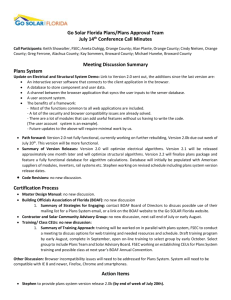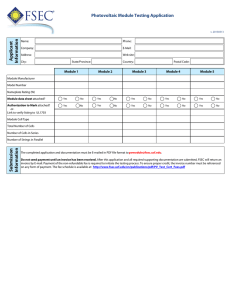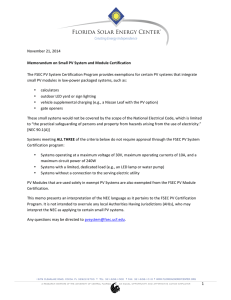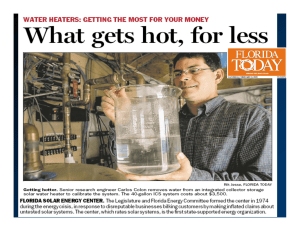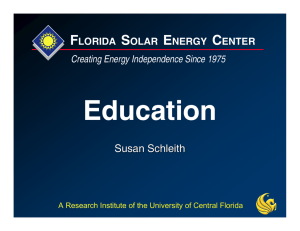EnergyWhiz: Learning Through Real World
advertisement
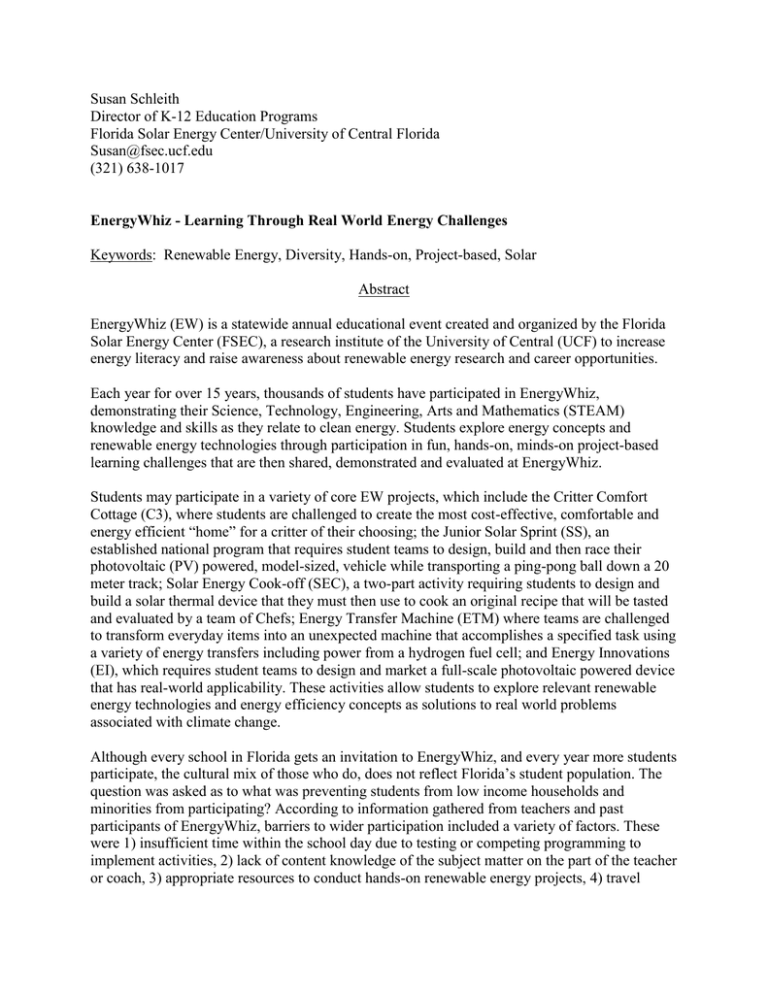
Susan Schleith Director of K-12 Education Programs Florida Solar Energy Center/University of Central Florida Susan@fsec.ucf.edu (321) 638-1017 EnergyWhiz - Learning Through Real World Energy Challenges Keywords: Renewable Energy, Diversity, Hands-on, Project-based, Solar Abstract EnergyWhiz (EW) is a statewide annual educational event created and organized by the Florida Solar Energy Center (FSEC), a research institute of the University of Central (UCF) to increase energy literacy and raise awareness about renewable energy research and career opportunities. Each year for over 15 years, thousands of students have participated in EnergyWhiz, demonstrating their Science, Technology, Engineering, Arts and Mathematics (STEAM) knowledge and skills as they relate to clean energy. Students explore energy concepts and renewable energy technologies through participation in fun, hands-on, minds-on project-based learning challenges that are then shared, demonstrated and evaluated at EnergyWhiz. Students may participate in a variety of core EW projects, which include the Critter Comfort Cottage (C3), where students are challenged to create the most cost-effective, comfortable and energy efficient “home” for a critter of their choosing; the Junior Solar Sprint (SS), an established national program that requires student teams to design, build and then race their photovoltaic (PV) powered, model-sized, vehicle while transporting a ping-pong ball down a 20 meter track; Solar Energy Cook-off (SEC), a two-part activity requiring students to design and build a solar thermal device that they must then use to cook an original recipe that will be tasted and evaluated by a team of Chefs; Energy Transfer Machine (ETM) where teams are challenged to transform everyday items into an unexpected machine that accomplishes a specified task using a variety of energy transfers including power from a hydrogen fuel cell; and Energy Innovations (EI), which requires student teams to design and market a full-scale photovoltaic powered device that has real-world applicability. These activities allow students to explore relevant renewable energy technologies and energy efficiency concepts as solutions to real world problems associated with climate change. Although every school in Florida gets an invitation to EnergyWhiz, and every year more students participate, the cultural mix of those who do, does not reflect Florida’s student population. The question was asked as to what was preventing students from low income households and minorities from participating? According to information gathered from teachers and past participants of EnergyWhiz, barriers to wider participation included a variety of factors. These were 1) insufficient time within the school day due to testing or competing programming to implement activities, 2) lack of content knowledge of the subject matter on the part of the teacher or coach, 3) appropriate resources to conduct hands-on renewable energy projects, 4) travel constraints to get to the EnergyWhiz event at FSEC and 5) the cost of participation. FSEC has implemented several strategies over the years to address these barriers with some success. FSEC began an effort in 2012 to engage more under-represented students in EnergyWhiz by addressing several of the obstacles preventing participation. The first barrier to more participation – lack of time on the part of the teacher due to testing or competing programming – led us to seek out coaches or mentors from outside the classroom. Many of the Title 1 schools – those with 50% or more students receiving free or reduced cost lunch – didn’t have the time during the traditional school day for any additional activities. Teachers wanted to participate, but they were stretched to the limit. However, many of these very same schools had afterschool programs. These schools were often part of the 21st Century Community Learning Centers, which sought out quality hands-on, minds-on STEM activities. EnergyWhiz was a perfect fit! FSEC has been making in-roads with the after school provider networks by sharing information through targeted conferences, workshops and through district level meetings with decision makers. The second obstacle was the lack of knowledge and confidence that some teachers had regarding solar and other renewable energy technologies. Many teachers knew very little about solar technology. Their only experience was building a pizza box cooker that didn’t cook anything. The majority of teachers were also unfamiliar with photovoltaic (solar electric) technology and often confused it with solar thermal applications. Professional development opportunities where teachers, mentors and coaches do the hands-on activities with the guidance of those experienced with solar technology yield positive results. They see that the technology works, where problems may arise, and can work through problems in a non-threatening environment. Participants quickly gain confidence and learn that these energy concepts are not so hard to teach. Numerous professional development workshops covering solar, hydrogen, photovoltaics and energy transfer concepts are facilitated by FSEC education staff. Hundreds of educators participate in each year. The third barrier - getting materials into the hands of students - has been addressed in several ways. Through the professional development workshops, FSEC not only provided curricular materials for the participants to keep, but also made loaner kits available when school funding was not available to purchase appropriate items. Through the Sunsmart Schools Emergency Shelter program over 350 teachers participated in hands-on workshops where they also received Sunsmart (Solar Matters) kits. Additionally, the Florida Energy Office within the Florida Department of Agriculture and Consumer Services (FDACS) has provided well over 100 free Sunsmart and JSS kits to schools throughout Florida. These kits contain reusable items that allow for a class of 25 students to complete solar and other renewable energy, hands-on activities. FSEC also maintains a Lending Library of materials that not only include the kits mentioned above, but also include videos, books, and various type of manufactured solar ovens that can be checked out to educators in Florida. A fourth obstacle to participation in EnergyWhiz is the distance that many teams must travel in order to attend the event at FSEC in May. Florida is an oddly shaped state where you can travel from the Atlantic Coast to the Gulf Coast in less than three hours. However, it is 792 miles from Pensacola to Key West. A trip from the Keys or Panhandle to Cocoa, where the statewide EnergyWhiz event is held is a seven hour or more, car ride. Those teams that can, often drive up a day before and take on the added expense of lodging for one or two nights. When students stay over, additional chaperones may also be needed. For many teams, this is not even a possibility. If students can’t come to EnergyWhiz at FSEC, let’s bring EnergyWhiz to them! In order to reduce the travel commitment, FSEC began an outreach effort in 2012, to identify potential partners that would host smaller regional EnergyWhiz events. FSEC would provide the know-how, rules, forms, loaner equipment and technical assistance as long as a partner would coordinate the effort within their community. Partners could design the event to include those activities that made the most sense to them, invite businesses, recruit volunteers and make it their own, but with the EnergyWhiz name behind it. Additionally, teams that won, would be given free registration to the FSEC EnergyWhiz event, if they chose to attend. The first of these EnergyWhiz Expos was held in Gainesville, FL in 2013. It was coordinated by two dedicated professionals, Adrienne Thieke, a master teacher and veteran of EnergyWhiz and Theresa Spurling-Wood, a passionate environmentalist and school district energy manager. They began with two activities, Junior Solar Sprint and the Solar Energy Cook-off. Each year since, the numbers of students participating have increased as well as the scope of the program. Today, there are four EnergyWhiz Expos held throughout Florida, which precede the EnergyWhiz event at FSEC. These include ones in Tallahassee, Orlando, Tampa and Gainesville. Next year, there are plans to add another EnergyWhiz Expo in south Florida. The last obstacle to reaching more students is funding. Funds are needed to provide the professional development, purchase materials, carry out the activities in the classroom or afterschool, expand the number of EnergyWhiz Expo opportunities to reach even more students, support the existing EnergyWhiz Expos, as well as the statewide EnergyWhiz event at FSEC. This program is run off donations, sponsorships, grants, partnerships and the goodwill of FSEC. Salaries for some key FSEC personnel are partially covered by FSEC/UCF, but it takes well over 100 people to put on this statewide EnergyWhiz event and most of those people are volunteers. One of the goals of the program from the beginning was to keep costs low in order to encourage participation from as many students as possible. We have managed to do that, but each year it is harder and harder to get funding. We are continually looking for financial support to continue these programs, but it can be discouraging when the current leadership in Florida does not support climate change education. EnergyWhiz has evolved over the years from a single program to now five events that reflect core research areas at the Florida Solar Energy Center. These areas are critical to solving climate change problems. By introducing students to these core ideas and renewable energy technologies, they are empowered to think differently about the world. Using their stem capabilities, they are given the freedom to think, create and demonstrate their energy solutions in a fun and celebratory way at EnergyWhiz.
